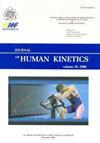努力、奖励、毅力、倦怠和持续运动意愿的差异:韩国运动员努力-奖励不平衡的评估
IF 2.8
3区 医学
Q2 SPORT SCIENCES
引用次数: 0
摘要
尽管有研究表明,在工作场所,努力和回报之间的不平衡会对个人的生理和心理健康产生负面影响,但很少有人关注这种不平衡如何影响运动员的心理状态。因此,本研究旨在通过检查心理变量是否会因ERI而有所不同,来评估运动员努力-奖励不平衡(ERI)的重要性。为此,招募了795名注册的大学运动员。其中,227和230个应答者的ERI处于ERI量表的底部和顶部的30%,以比较高和低的ERI组。运动员自行填写64项问卷(一般特征:5;工作:14;奖励:14;勇气:12个;精力枯竭:15;持续运动意向:4项)。数据分析采用Jamovi和SPSS/AMOS软件进行信度和效度分析。结果显示,基于性别、每周训练频率和每天训练时间,在努力、奖励、毅力、倦怠和继续锻炼的意愿方面没有显著差异。在努力、回报、毅力、倦怠和继续锻炼的意愿方面,职业联赛的存在是不同的。此外,在努力、奖励、毅力、倦怠和继续锻炼的意愿方面,在低ERI组和高ERI组之间也存在差异。那些对自己的努力和回报感到满意的人和那些对自己的努力和回报不满意的人的精神状态有明显的不同。然而,考虑到两组人每周花在锻炼上的时间大致相同,这种差异可能更多的是运动员的心理作用,而不是努力和回报的实际差异。由于我们的研究结果证实了运动员的ERI水平与他们的精神状态有关,因此需要进一步的研究来识别和控制影响运动员ERI的因素。本文章由计算机程序翻译,如有差异,请以英文原文为准。
Differences in Effort, Reward, Grit, Burnout, and Continuous Exercise Intention: Assessing the Effort-Reward Imbalance among Korean Athletes
Although studies have shown that an imbalance between effort and reward in the workplace negatively affects an individual’s physiological and mental health, few have looked at how this imbalance may affect the mental state of athletes. Therefore, this study aimed to evaluate the importance of the effort-reward imbalance (ERI) in athletes by examining whether psychological variables would differ depending on the ERI. To accomplish this, 795 registered collegiate athletes were recruited. Of them, 227 and 230 responses with the ERI in the bottom and in the top 30% of the ERI scale were selected to compare groups with a high and a low ERI. Athletes completed a self-reported 64-item questionnaire (general characteristics: 5; effort: 14; rewards: 14; grit: 12; burnout: 15; and continuous exercise intention: 4 items). Data analysis included reliability and validity using the Jamovi and SPSS/AMOS software. The results showed no significant differences in effort, reward, grit, burnout, and intention to continue to exercise based on gender, weekly training frequency, and hours of training per day. There were differences in effort, reward, grit, burnout, and intention to continue exercising based on the presence of a professional league. Additionally, differences were found in effort, reward, grit, burnout, and intention to continue exercising between the low and high ERI groups. There was a clear difference between the mental state of those who were satisfied with their effort and reward, and those who were not. However, given that the two groups spent approximately the same amount of time exercising each week, the difference may have been more a function of the psychology of athletes than an actual difference in effort and reward. As our findings confirmed that the level of the ERI in athletes is related to their mental state, further research is necessary to identify and control factors that affect the ERI in athletes.
求助全文
通过发布文献求助,成功后即可免费获取论文全文。
去求助
来源期刊

Journal of Human Kinetics
医学-运动科学
CiteScore
4.80
自引率
0.00%
发文量
83
审稿时长
3 months
期刊介绍:
The Journal of Human Kinetics is an open access interdisciplinary periodical offering the latest research in the science of human movement studies. This comprehensive professional journal features articles and research notes encompassing such topic areas as: Kinesiology, Exercise Physiology and Nutrition, Sports Training and Behavioural Sciences in Sport, but especially considering elite and competitive aspects of sport.
The journal publishes original papers, invited reviews, short communications and letters to the Editors. Manuscripts submitted to the journal must contain novel data on theoretical or experimental research or on practical applications in the field of sport sciences.
The Journal of Human Kinetics is published in March, June, September and December.
We encourage scientists from around the world to submit their papers to our periodical.
 求助内容:
求助内容: 应助结果提醒方式:
应助结果提醒方式:


